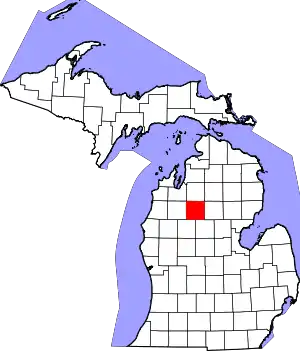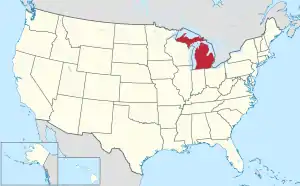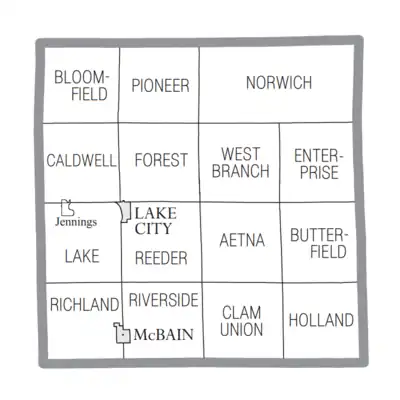Missaukee County | |
|---|---|
.jpg.webp) Missaukee County Courthouse in Lake City | |
 Location within the U.S. state of Michigan | |
 Michigan's location within the U.S. | |
| Coordinates: 44°20′N 85°06′W / 44.34°N 85.1°W | |
| Country | |
| State | |
| Founded | 1840 (created) 1871 (organized)[1] |
| Seat | Lake City |
| Largest city | Lake City |
| Area | |
| • Total | 574 sq mi (1,490 km2) |
| • Land | 565 sq mi (1,460 km2) |
| • Water | 9.1 sq mi (24 km2) 1.6% |
| Population (2020) | |
| • Total | 15,052 |
| • Density | 26/sq mi (10/km2) |
| Time zone | UTC−5 (Eastern) |
| • Summer (DST) | UTC−4 (EDT) |
| Congressional district | 1st |
| Website | www |

Missaukee County (/mɪˈsɔːki/ mih-SAW-kee) is a county located in the U.S. state of Michigan. As of the 2020 census, the population was 15,052.[2] The county seat is Lake City.[3]
Missaukee County is part of the Cadillac, MI micropolitan statistical area. The county is considered to be part of Northern Michigan.
History
Missaukee County was partitioned from Mackinac County, on April 1, 1840,[4] due to expected population growth. In 1851, the county was attached to Grand Traverse County for legal purposes.[5] It was subsequently attached to Manistee County in 1855 and Wexford County in 1869, before being organized in its own right in 1871.[6]
Etymology
Missaukee County may be named after a prominent Ottawa chief, Nesaukee, who signed the treaties of 1831 and 1833.[1][7] However, it is also said that "Nesaukee" could be interpreted as 'large mouth of the river.' [8]
Geography
According to the U.S. Census Bureau, the county has a total area of 574 square miles (1,490 km2), of which 565 square miles (1,460 km2) is land and 9.1 square miles (24 km2) (1.6%) is water.[9]
Lakes and rivers
There are 33 natural freshwater lakes in Missaukee County.[10] The largest of these, Lake Missaukee, has a surface area of 1,800 acres (730 ha).[11] The lakes and streams in much of the county drain into the Muskegon River, which flows generally north to south through its eastern tier of townships. The 51.1-mile-long (82.2 km)[12] Clam River, a tributary of the Muskegon, flows generally west to east through the county. The Reedsburg Dam is located within Missaukee County.
Major highways
 M-42 is a short east–west route in the northwest of the county, connecting M-66 near Lake City to US Highway 131 at Manton.
M-42 is a short east–west route in the northwest of the county, connecting M-66 near Lake City to US Highway 131 at Manton. M-55 is an east–west route traversing the Lower Peninsula.
M-55 is an east–west route traversing the Lower Peninsula. M-66 is a north–south route running from the Indiana border to US Highway 31 in Charlevoix.
M-66 is a north–south route running from the Indiana border to US Highway 31 in Charlevoix.
Adjacent counties
- Kalkaska County - north
- Crawford County - northeast
- Roscommon County - east
- Clare County - southeast
- Osceola County - southwest
- Wexford County - west
- Grand Traverse County - northwest
Communities

Cities
Civil townships
Census-designated place
Other unincorporated communities
Demographics
| Census | Pop. | Note | %± |
|---|---|---|---|
| 1870 | 130 | — | |
| 1880 | 1,553 | 1,094.6% | |
| 1890 | 5,048 | 225.0% | |
| 1900 | 9,308 | 84.4% | |
| 1910 | 10,606 | 13.9% | |
| 1920 | 9,004 | −15.1% | |
| 1930 | 6,992 | −22.3% | |
| 1940 | 8,034 | 14.9% | |
| 1950 | 7,458 | −7.2% | |
| 1960 | 6,784 | −9.0% | |
| 1970 | 7,126 | 5.0% | |
| 1980 | 10,009 | 40.5% | |
| 1990 | 12,147 | 21.4% | |
| 2000 | 14,478 | 19.2% | |
| 2010 | 14,849 | 2.6% | |
| 2020 | 15,052 | 1.4% | |
| U.S. Decennial Census[13] 1790-1960[14] 1900-1990[15] 1990-2000[16] 2010-2018[2] | |||
At the census[17] of 2000, there were 14,478 people, 5,450 households, and 4,043 families residing in the county. The population density was 26 inhabitants per square mile (10/km2). There were 8,621 housing units at an average density of 15 per square mile (5.8/km2). The racial makeup of the county was 97.50% White, 0.20% Black or African American, 0.50% Native American, 0.24% Asian, 0.37% from other races, and 1.19% from two or more races. 1.17% of the population were Hispanic or Latino of any race. 24.6% were of Dutch, 18.3% German, 10.8% American, 10.0% English and 7.4% Irish ancestry. 97.9% spoke English and 1.1% Spanish as their first language. By 2020, the county had a population of 15,052, and its racial and ethnic makeup was predominantly non-Hispanic white.
In 2000, the median income for a household in the county was $35,224, and the median income for a family was $39,057. Males had a median income of $30,565 versus $20,905 for females. The per capita income for the county was $16,072. About 8.20% of families and 10.70% of the population were below the poverty line, including 13.20% of those under age 18 and 10.40% of those age 65 or over.
Religion
The Christian Reformed Church in North America was the biggest denomination in the county with 2,010 members and 7 congregations, almost 50% of the counties population adhere to the CRCNA,[18] followed by the Reformed Church in America with 3 congregations and 830 members, the third is the United Methodist Church with 3 churches and 500 members, the PC(USA) has 2 congregations and 200 members, but the Evangelical Presbyterian Church, the Lutherans (ELCA), baptists are also represented with 1 congregations each.[19] Missaukee County is part of the Roman Catholic Diocese of Gaylord and has 1 congregations and 800 members.[20] There is an Amish community in the county, founded in 2000, with two church districts in 2013.[21]
Education
The Wexford-Missaukee Intermediate School District, based in Cadillac, services the school districts in the county. The intermediate school district offers regional special education services and technical career programs to students of its districts.[22] Missaukee County is served by two regular public school districts, Lake City Area School District and McBain Rural Agricultural Schools.[23] Missaukee County has one private school , Northern Michigan Christian School.[24]
Government and politics
| Year | Republican | Democratic | Third party | |||
|---|---|---|---|---|---|---|
| No. | % | No. | % | No. | % | |
| 2020 | 6,648 | 75.93% | 1,967 | 22.47% | 140 | 1.60% |
| 2016 | 5,386 | 73.61% | 1,565 | 21.39% | 366 | 5.00% |
| 2012 | 4,665 | 66.39% | 2,274 | 32.36% | 88 | 1.25% |
| 2008 | 4,469 | 59.65% | 2,898 | 38.68% | 125 | 1.67% |
| 2004 | 5,055 | 68.12% | 2,319 | 31.25% | 47 | 0.63% |
| 2000 | 4,274 | 65.79% | 2,062 | 31.74% | 160 | 2.46% |
| 1996 | 3,012 | 49.99% | 2,256 | 37.44% | 757 | 12.56% |
| 1992 | 2,829 | 46.70% | 1,893 | 31.25% | 1,336 | 22.05% |
| 1988 | 3,566 | 68.26% | 1,621 | 31.03% | 37 | 0.71% |
| 1984 | 3,970 | 75.53% | 1,256 | 23.90% | 30 | 0.57% |
| 1980 | 3,221 | 63.47% | 1,563 | 30.80% | 291 | 5.73% |
| 1976 | 2,943 | 62.87% | 1,688 | 36.06% | 50 | 1.07% |
| 1972 | 2,647 | 71.79% | 924 | 25.06% | 116 | 3.15% |
| 1968 | 2,161 | 67.72% | 736 | 23.06% | 294 | 9.21% |
| 1964 | 1,786 | 58.08% | 1,288 | 41.89% | 1 | 0.03% |
| 1960 | 2,531 | 79.82% | 627 | 19.77% | 13 | 0.41% |
| 1956 | 2,433 | 76.80% | 727 | 22.95% | 8 | 0.25% |
| 1952 | 2,525 | 80.01% | 600 | 19.01% | 31 | 0.98% |
| 1948 | 1,742 | 68.21% | 750 | 29.37% | 62 | 2.43% |
| 1944 | 1,979 | 71.63% | 759 | 27.47% | 25 | 0.90% |
| 1940 | 2,154 | 66.83% | 1,037 | 32.17% | 32 | 0.99% |
| 1936 | 1,730 | 54.69% | 1,385 | 43.79% | 48 | 1.52% |
| 1932 | 1,439 | 51.60% | 1,282 | 45.97% | 68 | 2.44% |
| 1928 | 1,756 | 87.19% | 247 | 12.26% | 11 | 0.55% |
| 1924 | 1,723 | 85.09% | 208 | 10.27% | 94 | 4.64% |
| 1920 | 1,801 | 82.46% | 345 | 15.80% | 38 | 1.74% |
| 1916 | 1,160 | 54.46% | 917 | 43.05% | 53 | 2.49% |
| 1912 | 671 | 32.88% | 347 | 17.00% | 1,023 | 50.12% |
| 1908 | 1,570 | 74.98% | 445 | 21.25% | 79 | 3.77% |
| 1904 | 1,781 | 80.77% | 345 | 15.65% | 79 | 3.58% |
| 1900 | 1,421 | 67.12% | 616 | 29.10% | 80 | 3.78% |
| 1896 | 899 | 55.15% | 687 | 42.15% | 44 | 2.70% |
| 1892 | 665 | 48.61% | 622 | 45.47% | 81 | 5.92% |
| 1888 | 632 | 50.44% | 572 | 45.65% | 49 | 3.91% |
| 1884 | 470 | 54.09% | 373 | 42.92% | 26 | 2.99% |
The county government operates the jail, maintains rural roads, operates the major local courts, keeps files of deeds and mortgages, maintains vital records, administers public health regulations, and participates with the state in the provision of welfare and other social services. The county board of commissioners controls the budget but has only limited authority to make laws or ordinances. In Michigan, most local government functions — police and fire, building and zoning, tax assessment, street maintenance, etc. — are the responsibility of individual cities and townships.
Elected officials
- Prosecuting Attorney: David DenHouten
- Sheriff: Wilbur "Wil" Yancer
- County Clerk/Register of Deeds: Jessica Nielsen
- County Treasurer: Lori Cox
- Road Commissioners: Jack McGee; Larry Norman; Lonny Lutke
(information as of February 2021)
Election history
Missaukee County is one of Michigan's most strongly Republican counties, and one of the most consistently Republican in the nation since that party was founded. No Democratic presidential candidate has ever won Missaukee County since it was organized:[26] even Lyndon Johnson in 1964 when he swept the Northeast received no more than 42 percent of the county's vote,[27] which made Missaukee Barry Goldwater’s strongest county north or east of the Great Lakes. No Democrat since has received more than Barack Obama's 38 percent in 2008. In 2004, Republican George W. Bush received 68.1% in Missaukee County, his second highest percentage among Michigan's 83 counties. In 2008, Republican candidate John McCain was held down to below 60 percent, the only time and it has happened since 1964 without a strong third-party showing (Ross Perot in both 1992 and 1996) and just the second time since 1936. Regardless, it was still his second-strongest county in Michigan after Ottawa County, as he won by 21 points while Barack Obama carried the state by 16.5 points.[28] In both 2016 and 2020, the county was Donald Trump's strongest in Michigan as he won it both times by more than 50 points. In 2002, Republican gubernatorial nominee Dick Posthumus received 66.1% in Missaukee, which also ranked it as the #2 most Republican county in the state.
Despite its strong Republican leanings, Missaukee County has voted for Democratic gubernatorial candidates on two rare occasions, those being for James Blanchard in 1986 and William B. Fitzgerald Jr. in 1978.
See also
References
- 1 2 "Bibliography on Missaukee County". Clarke Historical Library, Central Michigan University. Retrieved January 20, 2013.
- 1 2 "State & County QuickFacts". United States Census Bureau. Retrieved September 15, 2021.
- ↑ "Find a County". National Association of Counties. Retrieved June 7, 2011.
- ↑ George Dawson (1840). Acts of the Legislature of the State of Michigan Passed at the Annual Session of 1840. Detroit. pp. 196–200.
- ↑ "History in Grand Traverse County, Michigan". genealogytrails.com. Retrieved January 21, 2023.
- ↑ "Crawford County Michigan". genealogytrails.com. Retrieved January 21, 2023.
- ↑ Michigan History, Arts and Libraries on sources of County names. Archived March 13, 2009, at the Wayback Machine
- ↑ "Missaukee County, Michigan". infomi.com.
- ↑ "2010 Census Gazetteer Files". United States Census Bureau. August 22, 2012. Archived from the original on November 13, 2013. Retrieved September 27, 2014.
- ↑ "Missaukee County MI Lakes". LakePlace.com. Retrieved June 21, 2015.
- ↑ Michigan Department of Natural Resources. "Lake Missaukee". State of Michigan. Retrieved June 21, 2015.
- ↑ U.S. Geological Survey. National Hydrography Dataset high-resolution flowline data. The National Map Archived 2012-03-29 at the Wayback Machine, accessed November 21, 2011
- ↑ "U.S. Decennial Census". United States Census Bureau. Retrieved September 27, 2014.
- ↑ "Historical Census Browser". University of Virginia Library. Retrieved September 27, 2014.
- ↑ "Population of Counties by Decennial Census: 1900 to 1990". United States Census Bureau. Retrieved September 27, 2014.
- ↑ "Census 2000 PHC-T-4. Ranking Tables for Counties: 1990 and 2000" (PDF). United States Census Bureau. Archived (PDF) from the original on March 27, 2010. Retrieved September 27, 2014.
- ↑ "U.S. Census website". United States Census Bureau. Retrieved January 31, 2008.
- ↑ "Religions in Missaukee County, Michigan - Lake City, McBain, Christian Reformed Church in North America, Reformed Church in America, Catholic Church". city-data.com.
- ↑ "The Association of Religion Data Archives - Maps & Reports". thearda.com.
- ↑ "The Diocese of Gaylord, Michigan : A Diocese of the Roman Catholic Church - Diocese of Gaylord". dioceseofgaylord.org.
- ↑ Joseph F. Donnermeyer and David Luthy: Amish Settlements across America, 2013, page 115.
- ↑ "Welcome". Wexford-Missaukee ISD. Retrieved July 11, 2023.
- ↑ National Center for Education Statistics. "Search for Public School Data - Missaukee County, MI". Institute of Education Sciences. Retrieved July 11, 2023.
- ↑ National Center for Education Statistics. "Search for Private Schools - Missaukee County, MI". Institute of Education Sciences. Retrieved July 11, 2023.
- ↑ "Dave Leip's Atlas of U.S. Presidential Elections".
- ↑ Menendez, Albert J.; The Geography of U.S. Presidential Elections, 1868-2004, pp. 223-227 ISBN 0786422173
- ↑ Dave Leip’s Atlas of U.S. Presidential Elections; 1964 Presidential General Election Data Graphs – Michigan
- ↑ "2008 Presidential General Election Results - Michigan".
Bibliography
- "Bibliography on Missaukee County". Clarke Historical Library, Central Michigan University. Retrieved January 20, 2013.
Further reading
- Romig, Walter (1986) [1973]. Michigan Place Names: The History of the Founding and the Naming of More than Five Thousand Past and Present Michigan Communities. Great Lakes Books. Detroit: Wayne State University Press. ISBN 978-0814318386.